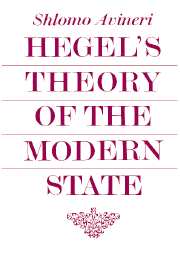Book contents
- Frontmatter
- Contents
- Title in the Series
- Preface
- 1 Beginnings
- 2 Positivity and Freedom
- 3 The Modernization of Germany
- 4 The New Era
- 5 Modern Life and Social Reality
- 6 The Owl of Minerva and the Critical Mind
- 7 The Political Economy of Modern Society
- 8 Social Classes, Representation and Pluralism
- 9 The State – the Consciousness of Freedom
- 10 War
- 11 The English Reform Bill – the Social Problem Again
- 12 History – the Progress towards the Consciousness of Freedom
- Epilogue
- Bibliography
- Index
Preface
Published online by Cambridge University Press: 05 June 2012
- Frontmatter
- Contents
- Title in the Series
- Preface
- 1 Beginnings
- 2 Positivity and Freedom
- 3 The Modernization of Germany
- 4 The New Era
- 5 Modern Life and Social Reality
- 6 The Owl of Minerva and the Critical Mind
- 7 The Political Economy of Modern Society
- 8 Social Classes, Representation and Pluralism
- 9 The State – the Consciousness of Freedom
- 10 War
- 11 The English Reform Bill – the Social Problem Again
- 12 History – the Progress towards the Consciousness of Freedom
- Epilogue
- Bibliography
- Index
Summary
Ever since Hegel's death in 1831, his political philosophy has continuously remained the focus of an agitated and heated discussion. The emergence of a ‘Young’ Hegelian school alongside the orthodox ‘Old’ Hegelian tradition pointed to some of the astounding ambiguities and potentialities inherent in the Hegelian system, as did the controversy between Karl Rosenkranz and Rudolf Haym about the political implications of Hegel's philosophy. Since then, almost every shade of political philosophy had protagonists claiming to state its case in what they considered to be a legitimate interpretation or derivative of Hegelianism. Socialists like Moses Hess, Karl Marx and Ferdinand Lassalle related their philosophies to Hegel in one way or another, just as did liberals like T. H. Green, Bernard Bosanquet and Benedetto Croce, and fascists like Giovanni Gentile; though interestingly enough, one would be hard-pressed to recall a comparatively prominent conservative thinker who could be termed a Hegelian. During World War II one British commentator credited Hegel with maintaining that ‘might indicates right’, whereas more recently others would tend to follow Pelczynski's contention that Hegel's conception of the state postulated ‘an ethical community’.
Surely such a dichotomic view calls for some clarification. It is the aim of this study to attempt to reconstruct the development of Hegel's political philosophy as seen through his various writings over the whole period of his activity.
- Type
- Chapter
- Information
- Hegel's Theory of the Modern State , pp. vii - xiiPublisher: Cambridge University PressPrint publication year: 1972

